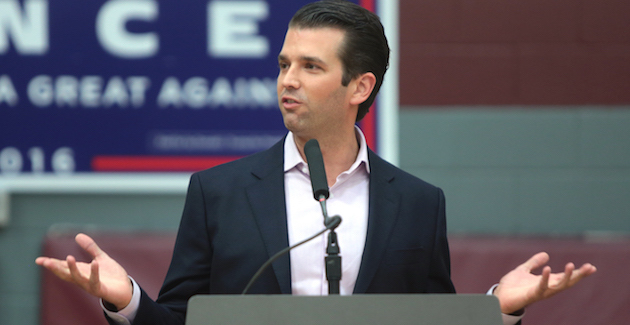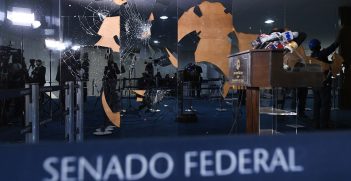Trump Campaign Collusion with Russia is Real News

This week’s shock news about meetings between senior Trump campaign members and a Russian lawyer linked to Putin is likely to disrupt the White House further. The silver lining may be that steadier hands are left to guide US foreign policy.
The New York Times’ revelation of the 2016 meeting between the US president’s son, Donald Trump Jr., and son-in-law Jared Kushner, and a Kremlin-linked lawyer is extraordinary and the first public evidence of attempted collusion between Trump’s campaign and the Russian government. Trump Jr. not only failed to report that Russian intelligence was attempting to support one presidential candidate; he may have broken the law by attempting to receive a campaign contribution from a foreign government. For Kushner, it is a meeting with a third Russian representative that he failed to mention in his initial security clearance application. The president denies any knowledge of the meeting, but his ignorance grows more implausible by the day.
Trump Jr.’s explanation of the meeting underwent daily revisions this week as the The New York Times’ reporting continued. He first claimed the meeting was just about US adoptions of Russian children; then that the Russian lawyer, Natalia Veselnitskaya, had lured him with the promise of compromising material on Hillary Clinton, but he didn’t think she was associated with the Russian government and she nonetheless failed to deliver. He also said that Kushner and the then Trump campaign manager Paul Manafort were uninformed about the meeting’s purpose before attending. Finally, he pre-empted the The New York Times’ publication of his emails to Rob Goldstone, a family friend who had organised the meeting, by sharing them on Twitter in a bid to appear “transparent”.
The decision to share the emails was utterly misguided. Rather than transparency, they demonstrated Trump Jr.’s knowledge that the Russian government sought to help his father’s presidential bid and his eagerness to collude with a Russian government-linked contact when given the opportunity. In Goldstone’s first email to Trump Jr., he described the material as part of the Russian “government’s support for Mr Trump” and coming from the “Crown prosecutor of Russia” (presumably the Russian prosecutor general, a “Putin appointee who is known to be close to Ms Veselnitskaya”). Trump Jr. replied, “if it’s what you say I love it”.
Both Trump Jr. and Veselnitskaya assert that no compromising material on Clinton was passed on at the meeting. Rather, discussion focused on adoptions and, particularly, the Magnitsky Act, against which Veselnitskaya is an active lobbyist. The Magnitsky Act allows the US government to seize the assets of “designated Russian human rights abusers … and keep them from entering the country”. Putin responded to the law’s passage in 2012 by “barring American families from adopting Russian children”. Given Putin’s displeasure with the Magnitsky Act, it’s not implausible that Veselnitskaya offered a quid-pro-quo: dirt on Clinton obtained by Russian intelligence in exchange for a promise to remove the sanctions.
Curiously, the timeline of events suggests that such material was indeed not passed on at the meeting, though both Donald Trump Jr. and Sr. may have anticipated it. As Frank Bruni observed, two days prior to the meeting—after Trump Jr.’s emails with Goldstone but before the actual meeting on 9 June 2016—Trump Sr. gave a speech promising to reveal incriminating information about Hillary Clinton on 13 June, but he never did. This is speculative, but given that the meeting took place with three of Donald Trump Sr.’s key advisers and Goldstone offered to speak directly with the future president, it would be surprising if Trump Sr. did not know of the meeting.
Consequences for Trump Jr.
Trump Jr.’s credibility is shredded. In July 2016, CNN asked him what he thought of the notion that Russians were behind the hacking of the Democratic National Committee. He called it “lies”: “They’ll say anything to … win this.” Yet a month earlier he had met with a Russian offering compromising information and knew the Russian government was supporting the Trump campaign.
Support for Trump Jr. from Republicans has been muted. Senate Majority Leader Mitch McConnell said he would leave the matter to the Senate Intelligence Committee; Republican Senator Lindsey Graham said the emails were “disturbing”. The president was silent on the matter for a few days, before releasing a statement applauding his son for his transparency but still denying his knowledge of the meeting. Democrats, unsurprisingly, have been much more critical. Senator Tim Kaine commented “this is moving into perjury, false statements and even potentially treason.”
While Republicans have hitherto been tolerant of presidential scandal, the distancing operations underway suggests Trump Jr. may take a fall. ‘Collusion’ itself is not a crime, but a few experts have suggested that Trump Jr. could fall foul of campaign finance laws prohibiting contributions from foreign governments, though it is unclear whether information is covered by such prohibitions. If Trump Jr. is forced to answer investigator’s questions about the meeting, he may reveal even more damning information about the Trump campaign’s Russian contacts.
Consequences for Kushner
Jared Kushner may face more serious trouble. This is now the third meeting with Russian representatives that Kushner failed to disclose on his security clearance forms. The other two, respectively, were with Russian Ambassador Sergey Kislyak, during which “they discussed opening a secret communications channel”, and Sergey Gorkov, head of a sanctioned Russian state-owned bank and former spy. It strains credulity that Kushner would forget these three contacts by coincidence. It is also hard to believe Kushner was unaware that the purpose of the June meeting with Veselnitskaya was to obtain damaging information on Clinton from the Russian government: he had been forwarded the email chain by Trump Jr., and busy people usually don’t attend meetings without knowing something about whom they’re meeting.
Thanks to Trump Jr.’s unhelpful email release, Republicans cannot plausibly deny the seriousness of Kushner’s actions. Kushner, who was probably already under investigation, risks being found to have knowingly made false statements on his security clearance form, a crime punishable by imprisonment. Since Russian intelligence may know more about what else Kushner is hiding, he is also a potential target for blackmail. Kushner is thus both a security threat and a political liability for the president and likely to be fired before long.
Consequences for the president
President Trump can no longer credibly call the Russia story ‘fake news’: thanks to his son, there is now clear evidence in the public domain that senior members of the Trump campaign sought to collude with the Russian government to win the election. There is not yet public evidence that the president is directly implicated, but his popularity will take a hit, and there will be increased incentives for Republican lawmakers to distance themselves from the president.
In the unlikely event that Kushner remains an adviser to the president, his influence will be severely diminished. As more Trump allies marginalise themselves due their incompetence or improprieties, the consequence will be that the more credible Cabinet members—especially Secretary of Defense James Mattis, National Security Adviser H. R. McMaster and Director of National Intelligence Dan Coats—will have an even greater role in formulating foreign policy. As in Afghanistan, we may see the president take a back seat in an increased number of policy areas.
Impeachment isn’t yet likely. But with the steady flow of stories and the ongoing Muller investigation (which, one supposes, will take great interest in Trump Jr.’s emails), don’t place any bets.
Cameron Steer is former editor of Australian Outlook. He is the US Fellow at Young Australians in International Affairs.
This Article is published under a Creative Commons Licence and may be republished with attribution.





